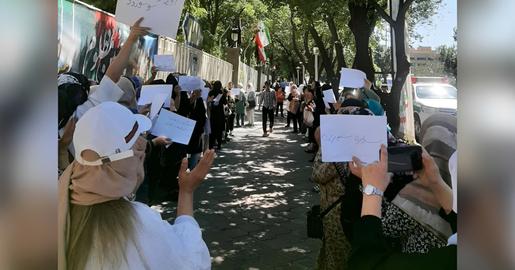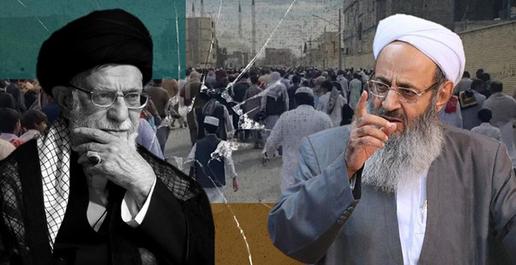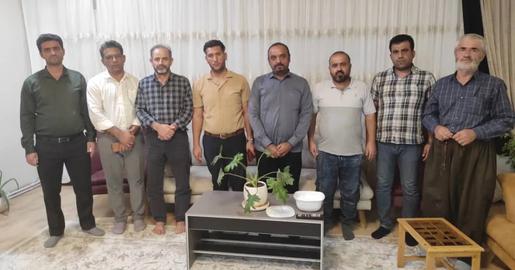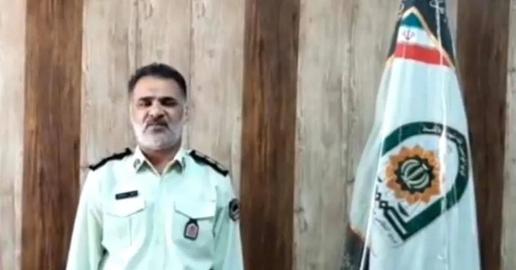Saeid Shanbehzadeh is on a mission to introduce Afro-Iranian music to the world. He has never waited for support from any ministry or an official institution, and he has never yielded to censors. When censorship and other pressures made it too difficult for him to continue with his music, he took on a job as a diver for a shipbuilding company. But not long after, he committed himself to doing whatever he could to carry on being a musician. He left Iran and started his own ensemble, promoting the ney anban (the traditional southern Iranian bagpipe) and the double-reed pipe and drum — accompanied by folk dancing and singing. He has appeared on stages all over the world.
African immigrants and slaves introduced music over the course of hundreds of years, and it became integrated with the local Iranian music. Shanbehzadeh is of African descent on his mother’s side; he grew up in a mostly black neighborhood in the Persian Gulf port of Bushehr. Music has always been central to his life, an important part of marking both happy celebrations and somber mourning ceremonies.
Now Shanbehzadeh and his ensemble will perform in New York and San Francisco as part of the Education Is Not A Crime campaign. The tour starts on September 17.
The campaign was started by IranWire’s publisher Maziar Bahari. It raises awareness about the denial of education to the Baha’is of Iran, the country’s largest religious minority. “Since the 1979 Islamic Revolution, Baha’is have not been able to study or teach in Iranian universities,” says Bahari. “We started our awareness-raising campaign in Harlem last year. There were two main reasons for bringing it to Harlem. Harlem is in New York, the center of the world, where world leaders gather every September for the United Nations General Assembly. Also, Harlem is synonymous with the African-American civil rights struggle, arts and creativity. African-Americans know about discrimination and suffering. They also know how to resist it and have achieved so much as a result of their peaceful non-violent resistance to institutionalized and unofficial discrimination against their community. The election of an African-American president in 2008, only 44 years after the civil rights act of 1964, is a clear example. Our campaign is in Harlem to raise awareness and share ideas with the African-American community, and we’re also here to learn from their experience. It also helps that the food is so good here!”
Saeid Shanbehzadeh is a supporter of the Not a Crime campaign. “You can find the roots and the history of the struggle for freedom in music,” he says. “As an artist I find it my duty to state that education is not a crime and no power has the right to deprive any human being of education. Why should a Baha’i fellow countryman of mine be deprived of education merely because of his religious beliefs?”
IranWire spoke to Shanbehzadeh about the ensemble’s US shows, the role of music in society, and about the Education is Not a Crime campaign.
Your US shows are part of the Education is Not a Crime campaign, which raises awareness about Baha’is in Iran, who continue to face discrimination and are barred from pursuing higher education. As a singer who broke rules and conventions, did you experience similar pressures?
I was subject to pressures for close to 10 years. The Ministry of Culture and Islamic Guidance brought false accusations against me and put obstacles in my way. If there was a gathering about music and I was scheduled to participate, they prepared the ground for getting me into trouble. If a musician was to visit Bushehr, they told him to dismiss and ignore me if I was there.
Here is one example. Mr. Faramarz Payvar [a composer and musician] was invited to Bushehr to deliver a speech. They had talked to him about me. Somebody behind me asked a question. “Why are you talking, sir?” asked Mr. Payvar. I turned around and looked behind me. “I am talking to you,” he said. “You, Mr. Black! Yes, that black gentleman!” I said, “Master, they are using you. It would have been better if you just played your music. I am sorry that the first thing you do is to mention the color of my skin. What if I call you ‘Mr. Baldhead’?” There was an uproar in the hall. I was young and passionate. They created a lot of problems for me.
So why did you decide to get behind the Education is Not A Crime campaign?
As an artist, I have always suffered from the sword of censorship. My struggle for freedom of expression and thought has been primarily aimed at liberating myself from the chains of the Iranian government and its censorship. Now I believe it is my duty to defend these freedoms for my fellow Iranians and everyone else around the world. Unfortunately, in my country there are many who cannot have access to an education because of their religious beliefs. I joined the Not A Crime campaign to support this basic human right for the Baha'is.
You were put under more pressure than others. Why?
They clamp down on you when you look for the truth. They do not want the truth to be known. I started encountering censorship when I started to concentrate on southern Iranian music and began to discover its reality through rhythm, dance, the participation of women — as opposed to their confinement at home — and songs that came from the hearts of the people.
Your first performances were well received at Fajr International Music Festival. Why did you start having difficulty getting permits to perform? Why did everything change suddenly?
I performed at many Fajr Festivals. At the 6th festival [in 1988], we were selected as the festival’s chosen group. They had no idea about my thinking and the philosophy behind southern Iranian music. They probably liked the rhythm and decided to give us a prize and forget about us.
Then I performed at the 12th Fajr Festival [in 1994]. The jury was made up of a group of prominent traditional musicians. For the duration of the festival’s performances, they had installed a floodlight on stage. When the floodlight was turned on it meant the group on stage must wrap up the performance. I found it greatly insulting and ridiculous. When they turned on the light I told the band: “You will not leave the stage until I tell you, no matter how many times they turn on the light.” I had spent a lot of time planning the performance. When we insisted on staying on stage, security people grabbed my hands to pull me off the stage, but I resisted. In the chaos, my shirt was torn off.
After that, I was banned from stage until 2001. In that year —when Khatami was president — they let me back on stage after the French embassy mediated.
Why do you think that classical Iranian music has always received more attention than the country’s regional music?
Traditional musicians are seen as the owners of national music. But this is not the national music. It is not the southern, Baluchi, Azeri or Lor music. Since the time of Reza Shah, authorities and others have stated that this is the authentic music of Iran, the highest form of music, a model that should be followed. And it has been given many privileges. It is a very pleasing music — but it is not the national music.
Tell us about what you did when you were unable to secure a permit to perform.
Since I could not do music, I started working as a diver for a shipbuilder named Maritime Industries Co. Life was very difficult. I had a child and many days I could not even afford cab fare. We did not have air conditioning in the horrible heat of Bushehr. My son was four years old then and we had to live with a single fan.
They sent me from Bushehr to an area known as Red Blood in Bandar Abbas [on the Persian Gulf]. I had to dive ten meters deep, swim into a big pipe and connect a set of smaller pipes together. My salary was three or four thousand tomans a month. I was putting my life on the line for a job that nobody else wanted to do. One day an Italian diver who supervised my work and with whom I sometimes spoke English asked me where I had learned English. I told him I was a musician and had performed in many countries, including France, America and Germany. I told him that I had even taught at a university in Canada. “Then what are you doing here?” he asked.
His question shook me. “What am I doing here?” I asked myself. That night the question kept me awake until dawn. That morning I resigned. I said to myself: I must be a musician no matter what.
You have had the experience of working both inside and outside Iran. In your experiences, what were the differences?
When I lived in Iran, the system and the society forced me to be aggressive all the time. I was forced to fight for my most basic rights — to get permits for concerts, to perform, for every and any simple thing. After I emigrated, I learned that my agressiveness was a creature of that system, and here my attitude has changed. Iran is ruled by a system — or I better say chaos — that defines art its own way. A free human being who wants to be artistically creative cannot accept to be obedient to these maxims. Even if you accept that the principles are meant to keep order, this compulsory order is often in opposition to the fundamental values and perceptions of an artist, because many artists cannot abide by such an order. Some artists are totally against creating work that conforms to an established shape or form. “Why must beauty be reduced to a certain framework?” they ask. Beauty can and must have different faces. Any human being can create his own different philosophy and world. And like many other one-dimensional governments, the government of Iran does not believe in artistic diversity. They accept the art only if the artist accepts the conditions set by the government.
Today there are many restrictions in Iran, even for traditional music. Music concerts in provincial towns are often cancelled. And female musicians encounter a lot of problems as well. But the musicians do live with censorship and they perform their concerts under such restrictions so they can get paid.
In many instances I was able to get the job done through flattery and self-control, but it could not continue. You turn into a puppet for government propaganda. Then they can put you up there whenever they want and pull you down when they decide otherwise. The last time I performed at Kish Island I said that I would not perform in front of the TV cameras. When the camera was turned on, I left the stage and they did not pay me.
Khomeini used to say: “Real art is art that is in the service of the doctrine.” I guess Stalin said the same thing. As an artist, I cannot accept that a government can dictate its beliefs to me. This has been my philosophy since I started. It remains the same to this day.
Saeid Shanbehzadeh and his ensemble will perform at San Francisco's Palace of Fine Arts on September 17 and New York's Apollo Theater on September 23. The live shows coincide with Iranian Foreign Minister Mohammad Javad Zarif’s visit to New York to attend the 71st Session of the United Nations General Assembly.
Read more about the Education is Not a Crime campaign.






















comments